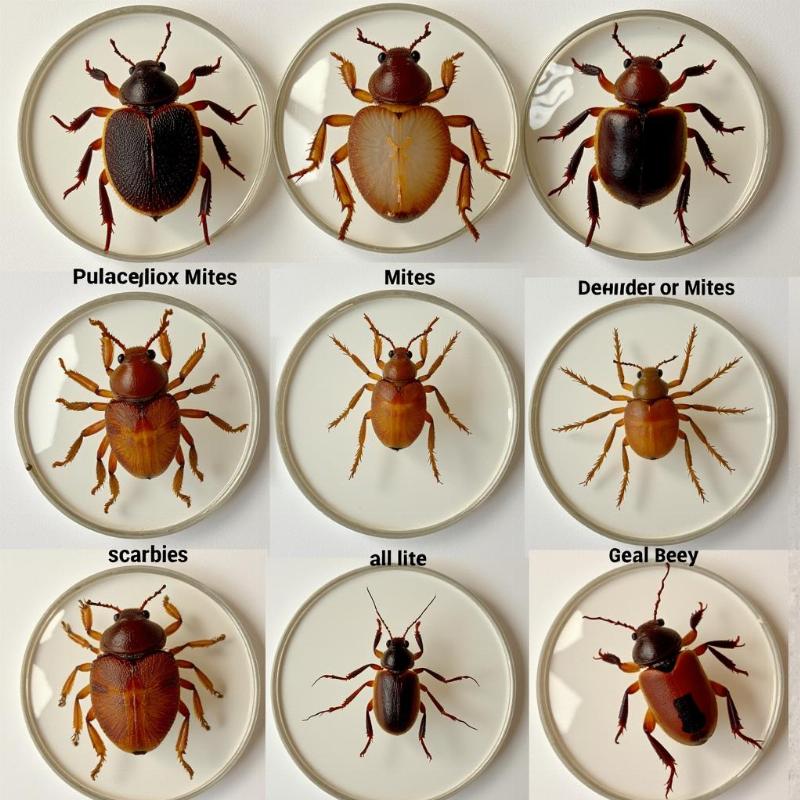Finding small black bugs on your dog can be alarming. What are they? Are they harmful? This article will help you identify common small black bugs that affect dogs in the US, understand their potential risks, and learn how to effectively treat and prevent infestations. We’ll cover everything from fleas and ticks to less common culprits, empowering you to keep your furry friend happy, healthy, and pest-free.
Common Small Black Bugs on Dogs: Fleas and Ticks
The most frequent small black bugs dog owners encounter are fleas and ticks. While tiny, these parasites can cause significant problems. Fleas are notorious for their irritating bites and can lead to flea allergy dermatitis, a severe skin condition. Ticks, on the other hand, transmit diseases like Lyme disease, Rocky Mountain spotted fever, and ehrlichiosis.
Identifying fleas and ticks is crucial for effective treatment. Fleas are small, dark brown to black, wingless insects that jump. Ticks can vary in size and color, but many species appear as small, dark brown or black bumps, especially when unengorged.
Proper flea and tick prevention is essential. A variety of effective products are available in the US market, including topical treatments, oral medications, and collars. Consult your veterinarian to determine the best option for your dog’s breed, age, and lifestyle. Regular grooming, including bathing and brushing, can also help detect and remove these pests.
Beyond Fleas and Ticks: Other Small Black Bugs
While fleas and ticks are the most common culprits, other small black bugs can infest dogs. These include lice, mites (like demodex and scabies mites), and even certain types of beetles or ants that might be attracted to dog food or waste.
 Identifying Other Small Black Bugs on Your Dog
Identifying Other Small Black Bugs on Your Dog
These pests can cause a range of issues, from skin irritation and hair loss to more serious health problems. If you notice unusual small black bugs on your dog that don’t resemble fleas or ticks, it’s important to consult your veterinarian for proper diagnosis and treatment.
Treating and Preventing Infestations
Treating an infestation depends on the type of pest. Your veterinarian can recommend appropriate medications, shampoos, or other treatments. Environmental control is also critical. Thoroughly cleaning your home, washing bedding, and vacuuming regularly can help eliminate pests and prevent re-infestation.
Don’t underestimate the importance of preventative measures. Regular flea and tick prevention, routine grooming, and maintaining a clean environment can significantly reduce the risk of your dog encountering these pesky critters.
Conclusion
Identifying and treating small black bugs on your dog is crucial for their health and well-being. By understanding the common culprits, utilizing effective preventative measures, and seeking veterinary guidance when necessary, you can protect your furry friend from these unwelcome guests. Remember, a proactive approach is the best defense against these tiny but troublesome pests.
FAQ
- How often should I check my dog for small black bugs? Ideally, you should check your dog daily, especially during flea and tick season.
- What should I do if I find small black bugs on my dog? Contact your veterinarian for proper diagnosis and treatment recommendations.
- Are over-the-counter flea and tick products effective? Yes, many are effective. However, consult your veterinarian for the best option for your dog.
- Can my dog get small black bugs from other animals? Yes, contact with other infested animals can spread pests.
- How can I prevent small black bugs in my home? Regular cleaning, vacuuming, and washing bedding are essential.
- Can small black bugs on my dog be harmful to humans? Some, like ticks, can transmit diseases to humans.
- What are the signs of flea allergy dermatitis? Excessive itching, scratching, hair loss, and skin inflammation.
Beautdogs.us is your premier resource for all things dog-related in the US. We offer expert advice on dog breeds, care, and products. Whether you’re a seasoned dog owner or just starting out, Beautdogs.us is your trusted companion on your dog ownership journey. Contact us for all your dog-related inquiries: Email: [email protected], Phone: +1 501-555-7529.